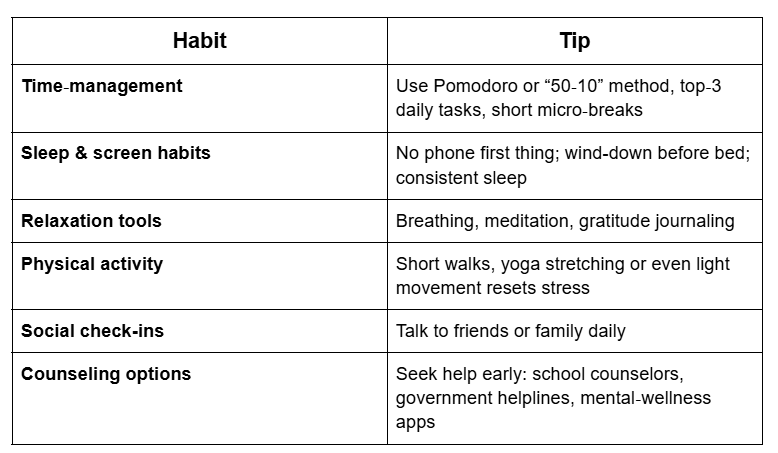Mental‑Health Tips for Aspirants (and Parents)
Preparing for JEE is tough, not just academically but emotionally. For many young students and their parents, the journey can feel overwhelming. Recent data shows Class 12 students in India are facing rising anxiety, self-doubt, sleep disturbances, and burnout as expectations escalate from coaching, schools, and families. A survey in coaching hubs like Kota found that about 20% of students report high stress levels, with insomnia and emotional exhaustion not uncommon. With stakes this high, smart strategies are essential.
1. Build a Sustainable Schedule-Not a Marathon of Grind
- Follow time‑blocking or reverse planning methods: Start with the exam date and work backwards, allocating study, break, and revision slots, just like experts suggest: 50 minutes study, 10 minutes break, also known as the “50‑10 technique.”
- Use micro‑breaks and habits: Stand up, hydrate, stretch every hour. Keep a done‑list instead of just to‑do list, and begin your day without immediately reaching for your phone; these habits help fight fatigue and keep morale high.
- Set realistic daily targets: Rather than obsessing over peer comparison, focus on three key tasks each day. This “Top 3” rule keeps progress measurable yet realistic.
2. Prioritize Mental Recovery & Downtime
- Take meaningful breaks: As one former aspirant put it, “JEE is not a 100 m sprint, it’s a marathon.” Include full days off when needed, even if it’s just once a week, to recharge emotionally and mentally.
- Add simple micro‑rituals: Practicing gratitude (writing one thing you’re thankful for) and using a screen‑free wind‑down routine before bed supports better sleep and reduces mental clutter.
3. Cultivate Mindfulness, Relaxation & Movement
- Try meditation, body‑scan, and breathing exercises: Even 5‑10 minutes daily can calm exam anxiety, improve focus, and help suspend panic modes.
- Include light physical activity: Walks, yoga, or a sport you enjoy help release tension and maintain mood balance, which is key when studying long hours.
4. Stay Connected with Family, Peers & Counselors
- Don’t isolate yourself: Regular check‑ins with parents or friends can lighten emotional load. One top‑scorer from Delhi credited nightly chats with his parents and simple distractions like watching Doraemon as key to staying balanced.
- Speak to a counselor if needed: Many institutions still lack enough mental health support: e.g. Panjab University has only one counselor for 16,000 students . If school or coaching centers don’t offer counseling, look for external resources or hotlines.
5. Keep Perspective-It’s Growth, Not Just Grades
- Shift focus from comparison to self‑progress: Reddit accounts from former aspirants confirm that burnout often comes when students constantly compare themselves rather than focusing on their own growth journey.
- Remember: JEE doesn’t define you: Many former aspirants regret that at IIT, they realized high rank came but mental health suffered. Learning to value hobbies, relationships, and personal interests alongside academics matters in the long term.
Checklist: Daily Habits to Avoid Burnout

Why Do These Work?
- Academic stress leads to decreased memory, sleep, and performance, and children often tie their self‑worth to exam scores which is a toxic mix.
- Limited mental health professionals in India: With only ~0.07 psychologists and 0.3 psychiatrists per 100,000 people, access is tight, early self-care is vital.
- Micro‑habits help more than long routines: Most of the time, actions like writing gratitude or hydrating before study contribute disproportionately to well-being compared to larger changes.
- Balanced achievers succeed: The 2025 Delhi top‑5 JEE scorer combined intense preparation with meditation, parental bonding, and simple fun, proving that mental resilience and balance matter just as much as study hours.
Final Thoughts for Aspirants & Parents
- Build consistency, not intensity: It’s better to study steadily with breaks than to cram nonstop.
- Parents can help by encouraging balance: Emotional support and realistic goal-setting at home can reduce anxiety and isolation.
- Celebrate small wins: Did you finish a tricky concept? Great! Did a timed mock test? That’s progress. These keep spirits up.
- Keep diversity in life: Books, music, drawing, hanging out, they’re not distractions, they keep your brain alive.
Your JEE journey is a challenge, but it’s also an opportunity to build resilience, maturity, and life skills. Remember: your grades don’t define your worth, and sustaining balance now can set you up not just for the exam, but for a healthier future.
Wishing you strength, balance, and clarity as you prepare for JEE 2026. You’ve got this!















No Comments
Leave a comment Cancel